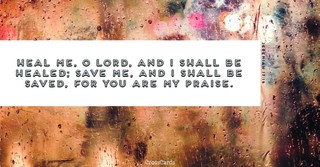
- Recent Translations
- All Translations
Jérémie 17
Share
Settings
Jérémie 17 Commentary
Chapter 17
The fatal consequences of the idolatry of the Jews. (1-4) The happiness of the man that trusts in God; the end of the opposite character. (5-11) The malice of the prophet's enemies. (12-18) The observance of the sabbath. (19-27)
Verses 1-4 The sins which men commit make little impression on their minds, yet every sin is marked in the book of God; they are all so graven upon the table of the heart, that they will all be remembered by the conscience. That which is graven in the heart will become plain in the life; men's actions show the desires and purposes of their hearts. What need we have to humble ourselves before God, who are so vile in his sight! How should we depend on his mercy and grace, begging of God to search and prove us; not to suffer us to be deceived by our own hearts, but to create in us a clean and holy nature by his Spirit!
Verses 5-11 He who puts confidence in man, shall be like the heath in a desert, a naked tree, a sorry shrub, the product of barren ground, useless and worthless. Those who trust to their own righteousness and strength, and think they can do without Christ, make flesh their arm, and their souls cannot prosper in graces or comforts. Those who make God their Hope, shall flourish like a tree always green, whose leaf does not wither. They shall be fixed in peace and satisfaction of mind; they shall not be anxious in a year of drought. Those who make God their Hope, have enough in him to make up the want of all creature-comforts. They shall not cease from yielding fruit in holiness and good works. The heart, the conscience of man, in his corrupt and fallen state, is deceitful above all things. It calls evil good, and good evil; and cries peace to those to whom it does not belong. Herein the heart is desperately wicked; it is deadly, it is desperate. The case is bad indeed, if the conscience, which should set right the errors of other faculties, is a leader in the delusion. We cannot know our own hearts, nor what they will do in an hour of temptation. Who can understand his errors? Much less can we know the hearts of others, or depend upon them. He that believes God's testimony in this matter, and learns to watch his own heart, will find this is a correct, though a sad picture, and learns many lessons to direct his conduct. But much in our own hearts and in the hearts of others, will remain unknown. Yet whatever wickedness there is in the heart, God sees it. Men may be imposed upon, but God cannot be deceived. He that gets riches, and not by right, though he may make them his hope, never shall have joy of them. This shows what vexation it is to a worldly man at death, that he must leave his riches behind; but though the wealth will not follow to another world, guilt will, and everlasting torment. The rich man takes pains to get an estate, and sits brooding upon it, but never has any satisfaction in it; by sinful courses it comes to nothing. Let us be wise in time; what we get, let us get it honestly; and what we have, use it charitably, that we may be wise for eternity.
Verses 12-18 The prophet acknowledges the favour of God in setting up religion. There is fulness of comfort in God, overflowing, ever-flowing fulness, like a fountain. It is always fresh and clear, like spring-water, while the pleasures of sin are puddle-waters. He prays to God for healing, saving mercy. He appeals to God concerning his faithful discharge of the office to which he was called. He humbly begs that God would own and protect him in the work to which he had plainly called him. Whatever wounds or diseases we find to be in our hearts and consciences, let us apply to the Lord to heal us, to save us, that our souls may praise his name. His hands can bind up the troubled conscience, and heal the broken heart; he can cure the worst diseases of our nature.
Verses 19-27 The prophet was to lay before the rulers and the people of Judah, the command to keep holy the sabbath day. Let them strictly observe the fourth command. If they obeyed this word, their prosperity should be restored. It is a day of rest, and must not be made a day of labour, unless in cases of necessity. Take heed, watch against the profanation of the sabbath. Let not the soul be burdened with the cares of this world on sabbath days. The streams of religion run deep or shallow, according as the banks of the sabbath are kept up or neglected. The degree of strictness with which this ordinance is observed, or the neglect shown towards it, is a good test to find the state of spiritual religion in any land. Let all; by their own example, by attention to their families, strive to check this evil, that national prosperity may be preserved, and, above all, that souls may be saved.
Jérémie 17 Commentaries
Chapter Summary
INTRODUCTION TO JEREMIAH 17
This chapter is a further prophecy of the destruction of the Jews, with the causes of it, their sins, as their idolatry, which was notorious; of which their own consciences, their altars, and their children, were witnesses, Jer 17:1,2 for which they are threatened with the spoil of their substance and treasure, and discontinuance in their land, Jer 17:3,4 as also their confidence in an arm of flesh, which brought the curse of God upon them, when such are blessed that trust in him; and the difference between those that trust in men and those that trust in the Lord is illustrated by very apt similes, Jer 17:5-8, the source of which vain confidence is the wicked heart of man, known to none but God, Jer 17:9,10 and the vanity of it is exposed by a partridge sitting on eggs without hatching them, Jer 17:11, and their departure from God, by trusting in the creature, and in outward things, is aggravated by their temple being the throne and seat of the divine Majesty; by what God is to his people that trust in him; and by the shame and ruin that follow an apostasy from him, Jer 17:12,13, wherefore the prophet, sensible of his own backslidings, prays to be healed and saved by the Lord, who should have all the praise and glory, Jer 17:14 and then relates the scoffs of the people at the word of God by him, another cause of their ruin; declares his own innocence and integrity; prays for protection and security from fear in a time of trouble; and for confusion, terror, and destruction to his persecutors, Jer 17:15-18, then follows an order to him from the Lord, to go and stand in the gate of the city, and exhort all ranks of men to the observation of the sabbath, with directions how to keep it, which had not been observed by their fathers, and which was another cause of their ruin, Jer 17:19-23, and the chapter is closed with promises of blessings in city, court, and country, in church and state, should they religiously observe the sabbath day; but if they profaned it, the city of Jerusalem, and its palaces, should be burnt with fire, Jer 17:24-27.

